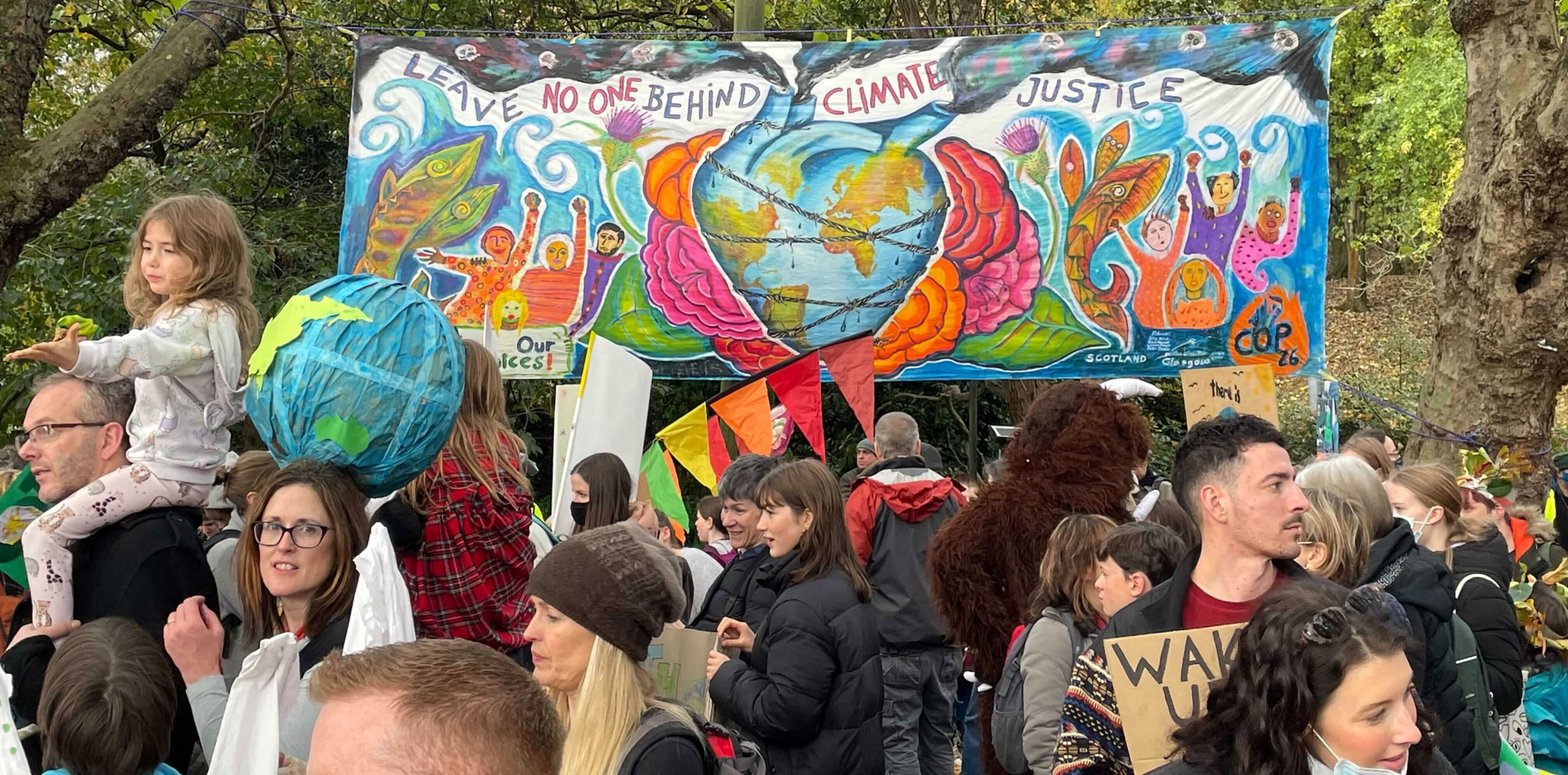Reflections from COP26, the United Nations annual climate change conference
“What do we want? Climate Justice!
When do we want it? Now!”
We chanted it in the streets in Glasgow at every protest I attended. Civil society chanted it loudly as thousands marched out of COP26 in disgust on Friday. And it was baked into the ethos of every daily briefing hosted by Climate Action Network Canada.
Yet in the text of the Glasgow Climate Pact, the final result of weeks of negotiations, these two words – climate justice – are mentioned just once, and even then, paternalistically in quotation marks: “…also noting the importance for some of the concept of ‘climate justice’, when taking action to address climate change”
And while he didn’t use the same words, I believe it’s this same idea that was behind the much-publicized intervention by the lead delegate from India. Alongside several other interventions, this led to the widely criticized further watering down of language from “phase-out” to “phase-down” of unabated coal production: “I propose escalating effort to phase down unabated coal power.”
And in this divide may lie both the failed outcomes of our multilateral climate negotiations, and the hope that can be found – if only we are to accept some difficult truths, and act on them decisively.
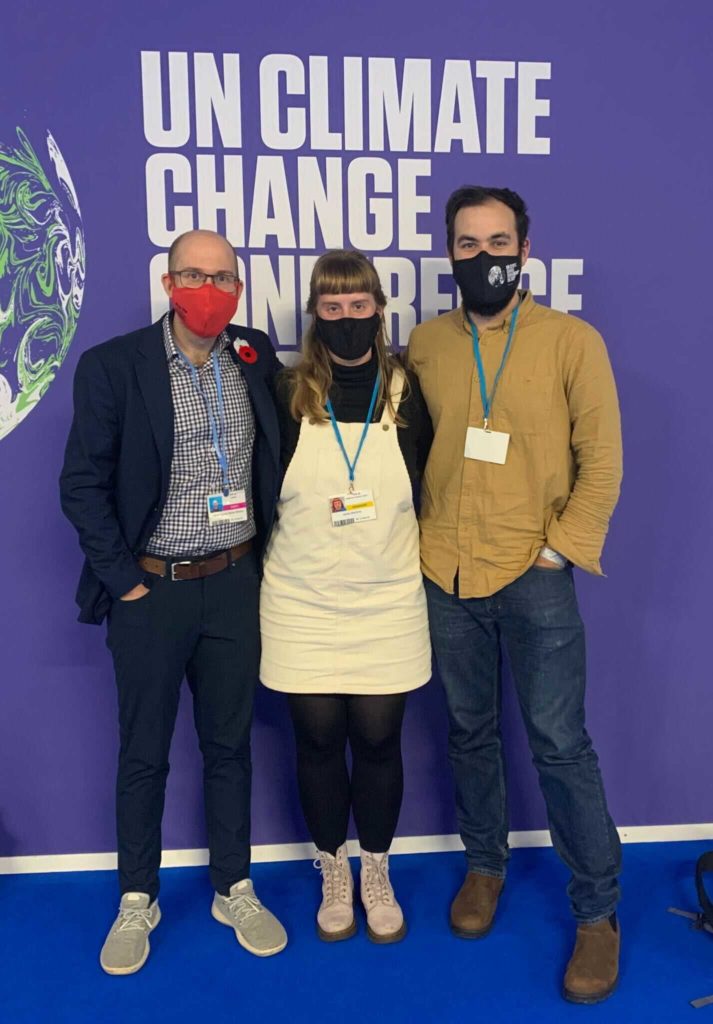
This was my first COP. It’s a surreal experience, being thrust into two weeks of negotiations where the agenda is the survival of our species. And it’s here where 200+ countries’ delegates come together to find consensus on how to respond quickly enough to mitigate the worst of the climate crisis, adapt to what is already underway, and adequately pay for the uninsured losses and damages being incurred by those hardest hit.
Of course, none of this is looking good, on any of these fronts. Even just on mitigating climate breakdown – we’ve already locked in 1.1C of warming. Scientists tell us we must limit warming to 1.5C. In the words of many low lying island states, including the Maldives, “The difference between 1.5C and 2C is a death sentence”, and all climate commitments submitted to-date have us on track for a 2.4C increase (and that is if countries follow through, despite these commitments being non-binding and not enforceable).
No doubt a bleak picture.
Add to it that what was just agreed to in Glasgow is so watered down, it barely keeps the possibility of 1.5C alive. It builds on a recent synthesis of all countries’ climate commitments that has us tracking towards a 15.9% increase in emissions from 2010 levels by 2030.
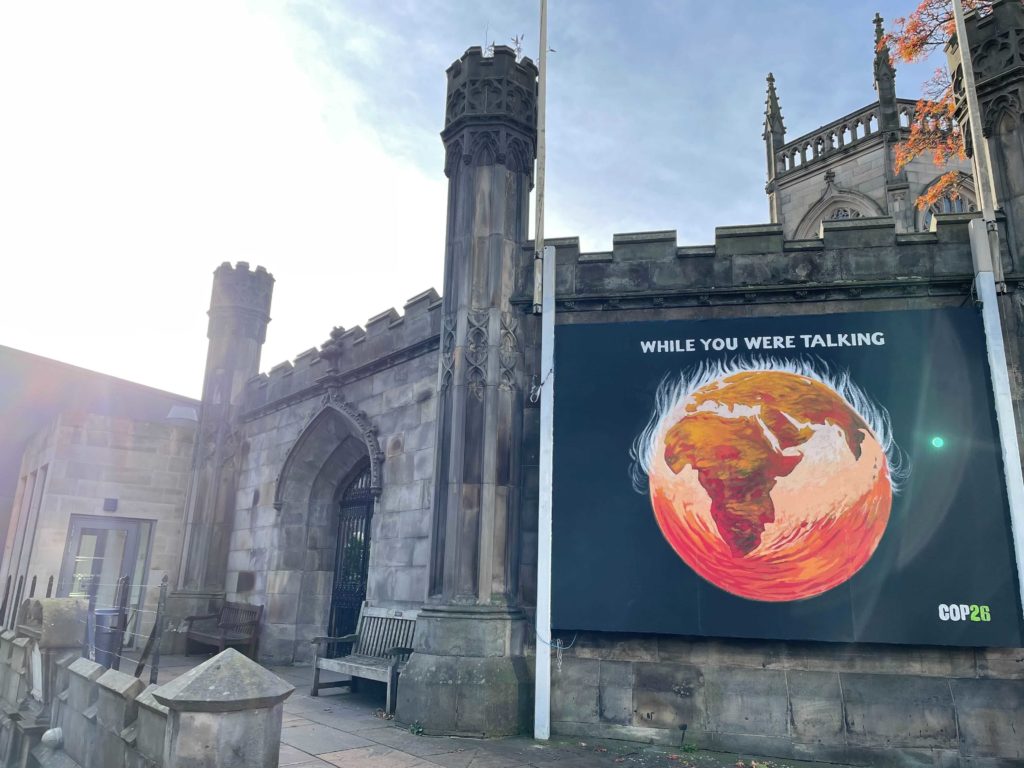
For our part in Canada, we’re the only one in the G7 whose emissions continue to rise, and to give a sense of our inaction, we continue to prop up the oil and gas industry with approximately $17B in public financing last year alone – even after our government announced our intention to eliminate international subsidies.
Many are now rightfully sharing their view: glossy headlines aside, we are inching closer to extinction.
And yet I have hope. Because the window for decisive action remains open, if only we were to be more honest with ourselves, and more willing to act decisively in pursuit of the kind of climate justice COP26 parties were still only willing to acknowledge with quotation marks around the term.
It may be a faint hope, but we can still choose to confront some difficult truths:
- Fossil fuels (coal, oil and gas) are the primary contributor to the climate crisis, accounting for over 75% of global GHG emissions. As such, we must stop burning oil, gas and coal, and we must so at the pace that scientists – like the Intergovernmental Panel on Climate Change (IPCC) – have called for. In Canada, this means at least a 60% reduction by 2030.
- The climate crisis and colonialism are deeply intertwined: The richest countries in the world – Canada included – have built their economies on the backs of unabated combustion of fossil fuels for over two hundred years. As a result, we have disproportionately fuelled the climate crisis. And paradoxically, the most devastating impacts of this crisis – while beginning to also hit close to home – are hitting hardest in many of the poorest parts of the world, predominantly in the Global South. We have a responsibility to these hard hit countries.
- Similarly, climate and capitalism can’t be separated: Having attended COP26 alongside MP Elizabeth May, I had the chance to learn from her decades of activism, including her involvement in the negotiation of the Montreal Protocol in 1987 that banned CFCs globally, arresting the growing hole in the ozone. Why hasn’t this success translated to 26 years of climate negotiations? Elizabeth’s reply: because in the decade between 1987 and the Kyoto Protocol in 1997, global powers like the World Trade Organization took hold, and with it came the elimination of trade sanctions as a permissible enforcement mechanism for global agreements. Without this kind of meaningful enforcement available to negotiators today, we are stuck hoping for the best from voluntary action. And obviously, it’s not working.
On each of these truths, there also lies a different path forward. And while one needed to look closely, there were seeds planted in Glasgow, even if not in the formal negotiations:
- We must phase out fossil fuels, and countries like Canada must lead the way. Rather than hiding behind our small population, we should recognize our disproportionate role in causing this crisis. We could act swiftly, prioritize a just transition for workers, and show true climate leadership for others to follow. We can and should start with the obvious: ending all fossil fuel subsidies, cancelling the Trans Mountain pipeline, and ending all exploration of new oil and gas projects. In Glasgow, for those looking for the seeds of change: Quebec was among 12 national and sub-national jurisdictions that joined the Beyond Oil and Gas Alliance, calling for this phase out. As well, the Parliamentarians’ Call for a Fossil Fuel Free Future was announced: initiated by 19 Parliamentarians from the Global South, over 150 Parliamentarians (including Elizabeth, myself and 7 other MPs across the country from the NDP and Liberal Party) have joined forces to call for this same action.
- We must heed calls for climate financing, both on adaptation and on a new facility (i.e. incremental funds) for uninsurable losses and damages: While it’s disappointing that back in 2009, some developed countries came up with their own goal behind closed doors – $100B in climate financing – at least some progress has been made towards it. We must go further, engage the Global South, and follow through on committed funds. Meanwhile, Scotland has stepped up: in Glasgow they became the first country to commit funds for losses and damages. While a paltry amount (£2M), this is the beginning of owning up to our responsibility to other countries.
- We must call for the renewed application of trade sanctions in climate negotiations, and ensure this has teeth.
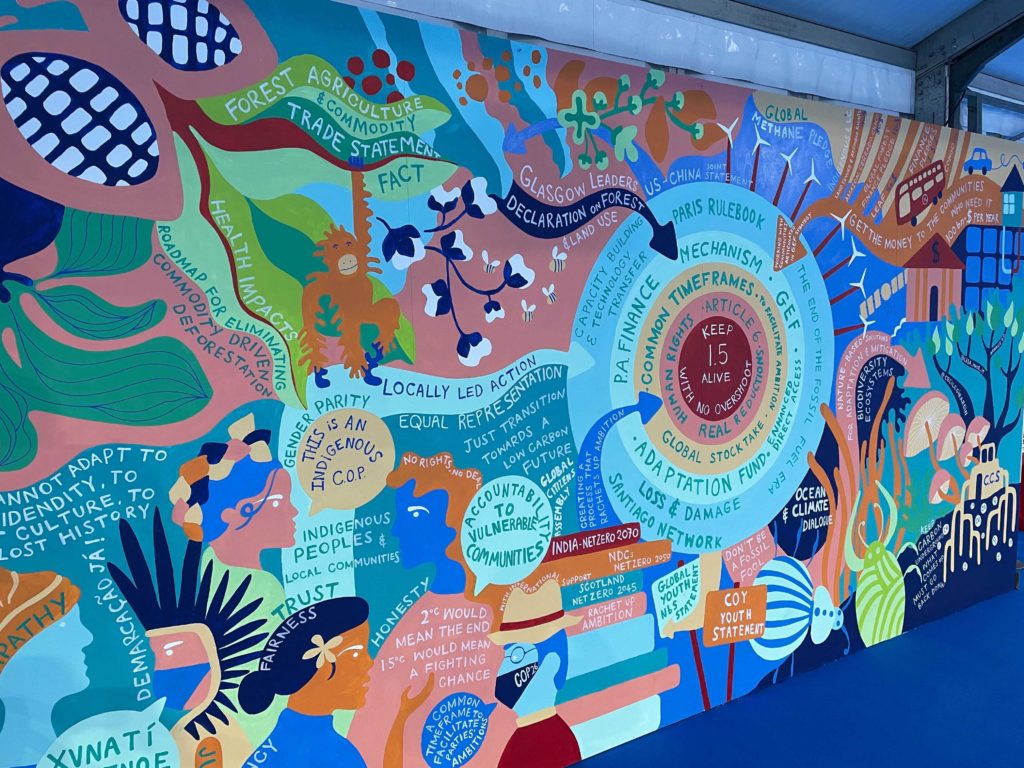
“What do we want? Climate Justice!
When do we want it? Now!”
In short, what countries like India are saying, is that rich countries like Canada need to contribute enough financially to the Global South, in order to have it make sense for them to not combust the plentiful fossil fuels at their disposal – just as we have already done. In return, we all get a livable planet.
For the average Canadian – the majority of whom want to see more ambitious climate action – I can see how this may be a difficult pitch: not only must we stop extracting our own oil and gas reserves in order to do our fair share to limit warming aligned with science, but we also need to allocate our fair share of the funds to both finance others to not repeat our mistakes, and contribute to paying for the losses and damages being suffered by those on the frontlines of this crisis.
As is so often the case, while there is obviously so much complexity, there is also simplicity: when we get passed the jargon and the geopolitics, it comes down to money.
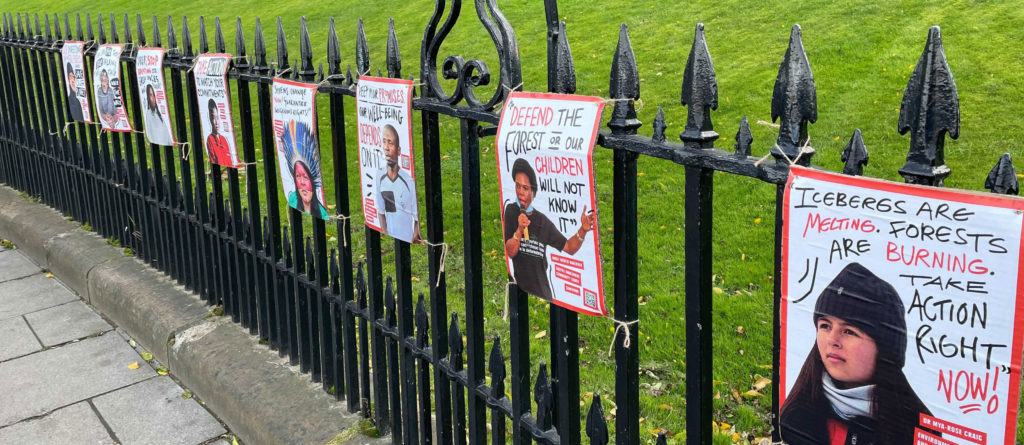
No doubt, in moments like this, despair is an easier choice than hope. It’s easy to despair, knowing that after 26 years of negotiations, emissions continue to rise. Holding onto hope though, this is work. Because hope needs to be justified. Empty hope is fleeting. The hope that sticks, is active hope. Because to have hope – in the face of such desperation – means to live it out.

One source of renewed hope for me, is young people. And not in some empty platitude about young people being our future. No – I’m energized by the young people at COP that were so direct and clear in calling for more from our political leaders. As one example, I won’t soon forget a young delegate, Xavier. Last Wednesday, at a briefing attended by the Minister of Environment & Climate Change – along with about a hundred members of the Canadian delegation, myself included – Xavier spoke up, to ask a question: why is our government peddling half measures rather than focusing on the science of the crisis, and why aren’t we engaging meaningfully in true climate justice?
While the Minister avoided directly responding to the question, not only was Xavier’s voice heard, but his point was made to the Minister, and to the rest of us: he saw right through our government’s thinly veiled optics of climate leadership. And I saw young people like Xavier everywhere at COP26: in the streets, on social media, and in the venue. Their future is on the line, they won’t be deceived, and they won’t be satisfied until honest, comprehensive and bold solutions are on offer.
Another source of hope was the personal reminder of my own privilege in being in these rooms. Why was I there at all? Because of hundreds and hundreds of people back home who knocked on thousands and thousands of doors, knowing I would not shy away from being honest, be it on the climate crisis or other priorities. One conversation at a time, we engaged with our community, and we were rewarded with the profound responsibility to represent their interests, and to be their voice, in exclusive venues like COP26. My mandate was, and continues to be, to do all I can to secure a safe climate future for our kids.
And to my relief, I met so many others at COP26 with a similar mandate:
- Organizers at Climate Action Network Canada, Sierra Club, faith-based organizations like ACT Alliance – the list goes on and on.
- Parliamentarians too: from the 150 others that signed onto that same call for a fossil fuel free future, to the dozens of other elected Greens I met, many of whom were Ministers in coalition governments – from Iceland, to Scotland, to New Zealand.
- Indigenous leaders both inside, and even more so, outside the restricted COP26 venue.
- And protestors – from the families marching in the streets, to people I saw each day as I walked into the COP venue – with their signs and art reminding delegates that our very survival on this planet is on the line.
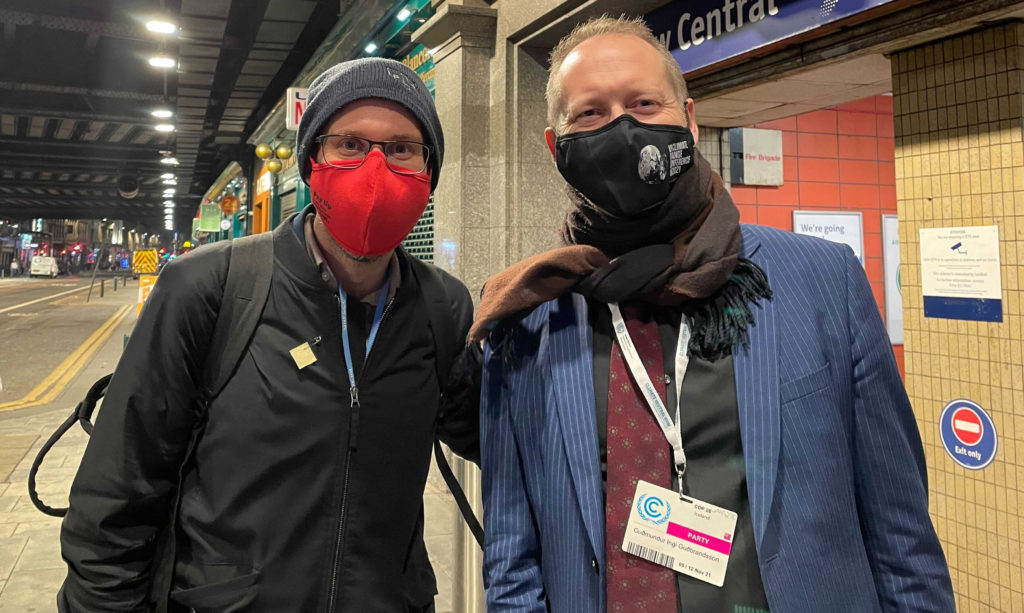
So, the work continues. We have a provincial election next June. A municipal one later next fall. There are protests to organize. People to mobilize. Pressure to put on our federal government.
This is the work we have the privilege to do, in this decisive decade. What an honour to do it.

